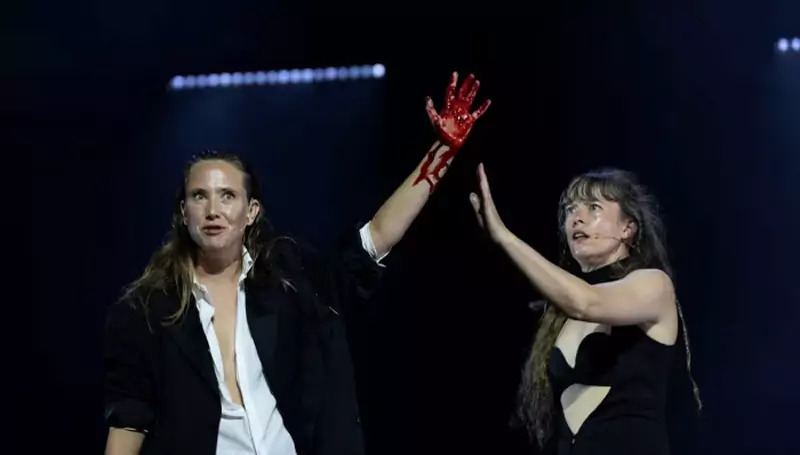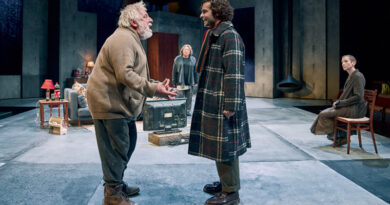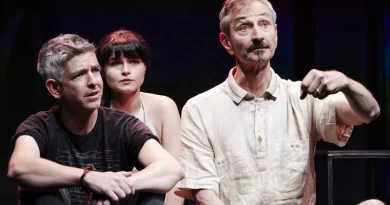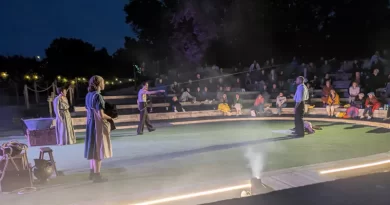“Penthesilea”, Edinburgh International Festival
Jeremy Malies in Edinburgh
11 August 2024
**** Four-star review
Duration: 120 minutes
Another radical treatment of a Greek tragedy from Internationaal Theater Amsterdam. I felt protective towards Medea at the Barbican, but regarded Penthesilea as a stranger who could survive a radical overhaul. I soon cared about her in Eline Arbo’s treatment of an 1808 version by Heinrich von Kleist.
Arbo, a Norwegian working in Dutch alongside Ivo van Hove, is known for collaborative rehearsals and this comes across as a group effort. The adaptor directs her own version and it begins with unaccompanied part-singing featuring intricate harmonic pitches from composer Thijs van Vuure.
This gives way to the predominant style which is more a baroque rock opera propelled by the drumming of Eefje Paddenburg whose kit ascends and descends from the ceiling as if a gift from Artemis. Melodies are sustained by an instrument (also flown down) that resembles a box organ.
Distant figures such as Penthesilea (played by Ilke Paddenburg) and lover Achilles (Jesse Mensah) reveal their idiosyncrasies as they drag mics around the stage and make asides to the stalls. The piece underlines the International Festival’s theme of “Rituals That Unite Us” by showing imperishable characters from a predominant culture to be vulnerable like any of us.
Penthesilea wonders if she has kissed Achilles to death, this being quite a transition from her earlier: “I want him at my feet in the dust!” She explains to Achilles that Amazons can only have sex with men who they have defeated in battle. His jaw drops, and he is affecting as he asks what fate befalls male babies. Discussion of hostage-taking and prisoners throws up current parallels.
The score, showing a persistent electronica influence, varies from hymns to folk. It has complex harmony but carries off the trick of seeming improvised by the on-stage musicians and emerging naturally from the conversations. The dialogue is in Dutch (with many Dutch speakers in the audience to keep the laughter going) and surtitles for the rest of us in which the gags largely disappear. I get it that the translation aims at showing us only the broad contours of the narrative but the clunkiness produced unwanted titters. I also wondered why, at moments of great intensity, snatches of English are inserted. A cynic might think that the Dutch language is thought to be incapable of doing the heavy lifting.
Less would be more as the all-but-naked couple ladle gunge over each other in the enormous cauldron that is their nuptial bed. And yet they manage to be tender and teasing as guitarist Felix Schellekens strums a snatch of Cutting Crew’s “(I Just) Died In Your Arms Tonight”.
Gallons of Kensington Gore (set design Pascal Leboucq) merge with petals as we watch a ceremony involving roses. It’s justified since on the huge Royal Lyceum stage, the scale must be near-operatic in order to enthuse the upper gallery. Penthesilea may be the most physically charged character on view but she can also be cerebral and chides her followers for being hedonistic: “You think only of orgies – mad dogs that you are.” This is a bloodthirsty orgy in terms of the preliminaries if the men are only there after losing comrades in battle.
Two brutal martial societies reveal themselves to have strands of tenderness, and everybody is tactile. “If you love somebody, how can you kill them without becoming half a human being?” Occasionally the tone is Wagnerian: “Are you one of the nymphs that serve us in the Shadowlands?” These may be characters from myth but they are being manipulated and destroyed by higher powers. “Joy and pain are equally bad; both engender madness.” Well, that bodes ill for all of us. Even at a running time of two hours, I was enthralled.









